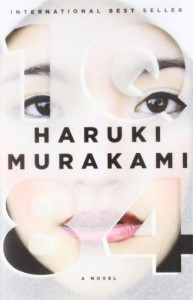Currently reading
1Q84 by Haruki Murakami

After reading most of Haruki Murakami's oeuvre, it's safe to say that he is my favorite living writer. At his best, he can paint a picture with words, adding layer after layer of description to a canvas that, as a whole, avoids becoming dense or encrusted, but rather maintains both delicacy and depth simultaneously. His characters can often be both non-descript and unique, which he often achieves with a simple parenthetical: "In order to flee from responsibility, Tengo learned early on in life to make himself inconspicuous. He worked hard to negate his presence by publicly displaying very little of his true abilities, by keeping his opinions to himself, and by avoiding situations that put him at the center of attention...It was necessary for him to keep such contrivances in mind at all times, like the orphans in Dicken's novels." 1Q84 is a long novel in three books. Like many of Murakami's works, it involves fantastical elements and synchronicities, not to say, coincidences. It would probably be going too far to describe it as a work of magical realism. I often prefer to think of some of his fantastic contrivances as metaphors--I'm thinking of his "INKlings" from the earlier Hard-Boiled Wonderland. In 1Q84, one can only do that for so long before "air chrysalises" run into actual "little people." But Murakami-lovers must have the fortitude to get beyond, or behind, such details. Murakami is known for building his stories around an earlier novelistic archetype--e.g., his Kafka at the Shore is primarily an Oedipus story. 1Q84 is obviously riffing on Orwell's 1984, and it carefully builds and maintains throughout the oppressive mood created by Orwell's surveillance machinery. Further, 1Q84 is similarly a romance, though in this case a decades long romance between an assassin avenging the wrongs suffered by the abused and molested, and a gifted, yet not overly successful, math teacher and novelist, neither of whom has been able to surpass their life-changing grade-school encounter. And this, all set against the machinations of a fanatic and powerful cult, bent on controlling the actions of these characters and those close to them. The first two books were set up as opposing third person narratives of the stories of the two main characters, and their inter-connections. I went through the set-up, and middle portions of the book--i.e., books one and two--like the proverbial knife through butter. But in the third book, where Murakami should have continued to cleave quickly while building forcefully to his conclusion, he chose to add a third perspective--that of the representative of the afore-mentioned surveillance machinery. This character was himself, quite interesting. I enjoyed seeing this weird world through his eyes. Unfortunately, the third perspective, meant the story began jumping back and forward on three tracks. It became a chore to decipher where we were in each characters stories. At this point, I put the book down for an extended period of rest and recuperation. Eventually, though, I had to know the end of the story: Would the lovers end up like Orwell's victims of the machine? I expected so, and was haunted by that potential. I won't spoil the resolution, but however it came out--and it did include elements that were macabre at best, I was quite satisfied with the conclusion. In sum, while not my favorite of Murakami's novels, I probably prefer Wind-up Bird or Kafka, or possibly, Norwegian Wood, I consider this 1157 page door-stop, well-worth anyone's time.











